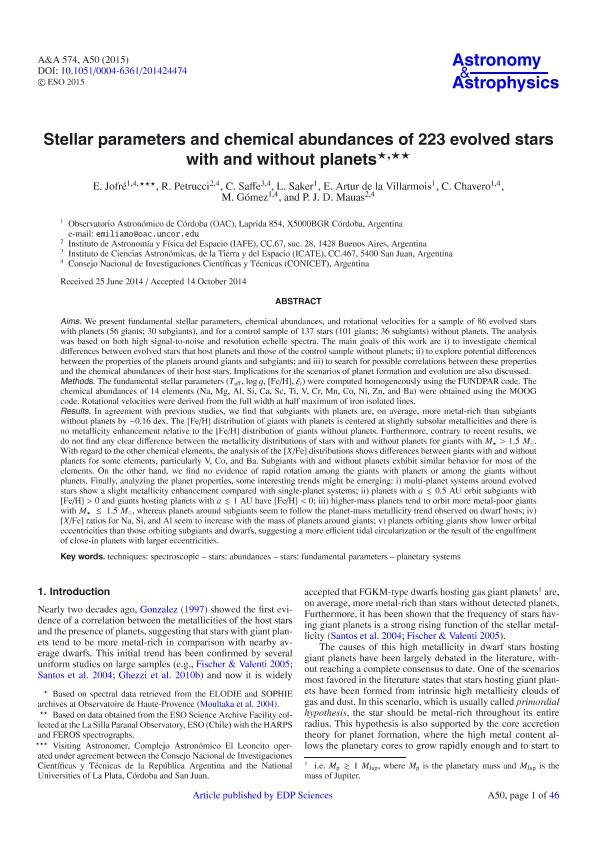Mostrar el registro sencillo del ítem
dc.contributor.author
Jofre, Jorge Emiliano

dc.contributor.author
Petrucci, Romina Paola

dc.contributor.author
Saffe, Carlos

dc.contributor.author
Saker, Leila Yamila

dc.contributor.author
Artur de la Villarmois, E.
dc.contributor.author
Chavero, Carolina Andrea

dc.contributor.author
Gomez, Mercedes Nieves

dc.contributor.author
Mauas, Pablo Jacobo David

dc.date.available
2016-09-07T19:10:04Z
dc.date.issued
2015-02
dc.identifier.citation
Jofre, Jorge Emiliano; Petrucci, Romina Paola; Saffe, Carlos; Saker, Leila Yamila; Artur de la Villarmois, E.; et al.; Stellar parameters and chemical abundances of 223 evolved stars with and without planets; Edp Sciences; Astronomy And Astrophysics; 574; A50; 2-2015; 50-96
dc.identifier.issn
0004-6361
dc.identifier.uri
http://hdl.handle.net/11336/7512
dc.description.abstract
We present fundamental stellar parameters and chemical abundances for a sample of 86 evolved stars with planets and for a control sample of 137 stars without planets. The analysis was based on both high S/N and resolution echelle spectra. The goals of this work are i) to investigate chemical differences between stars with and without planets; ii) to explore potential differences between the properties of the planets around giants and subgiants; and iii) to search for possible correlations between these properties and the chemical abundances of their host stars. In agreement with previous studies, we find that subgiants with planets are, on average, more metal-rich than subgiants without planets by ~ 0.16 dex. The [Fe/H] distribution of giants with planets is centered at slightly subsolar metallicities and there is no metallicity enhancement relative to the [Fe/H] distribution of giants without planets. Furthermore, contrary to recent results, we do not find any clear difference between the metallicity distributions of stars with and without planets for giants with M > 1.5 Msun. With regard to the other chemical elements, the analysis of the [X/Fe] distributions shows differences between giants with and without planets for some elements, particularly V, Co, and Ba. Analyzing the planet properties, some interesting trends might be emerging: i) multi-planet systems around evolved stars show a slight metallicity enhancement compared with single-planet systems; ii) planets with a $lesssim$ 0.5 AU orbit subgiants with [Fe/H] > 0 and giants hosting planets with a $lesssim$ 1 AU have [Fe/H] < 0; iii) higher-mass planets tend to orbit more metal-poor giants with M < 1.5 Msun, whereas planets around subgiants seem to follow the planet-mass metallicity trend observed on dwarf hosts; iv) planets orbiting giants show lower orbital eccentricities than those orbiting subgiants and dwarfs.
dc.format
application/pdf
dc.language.iso
eng
dc.publisher
Edp Sciences

dc.rights
info:eu-repo/semantics/openAccess
dc.rights.uri
https://creativecommons.org/licenses/by-nc-sa/2.5/ar/
dc.subject
Techniques: Spectroscopic
dc.subject
Stars: Abundances
dc.subject
Stars: Fundamental Parameters
dc.subject
Planetary Systems
dc.subject.classification
Astronomía

dc.subject.classification
Ciencias Físicas

dc.subject.classification
CIENCIAS NATURALES Y EXACTAS

dc.title
Stellar parameters and chemical abundances of 223 evolved stars with and without planets
dc.type
info:eu-repo/semantics/article
dc.type
info:ar-repo/semantics/artículo
dc.type
info:eu-repo/semantics/publishedVersion
dc.date.updated
2016-07-22T13:44:31Z
dc.journal.volume
574
dc.journal.number
A50
dc.journal.pagination
50-96
dc.journal.pais
Francia

dc.journal.ciudad
Paris
dc.description.fil
Fil: Jofre, Jorge Emiliano. Universidad Nacional de Cordoba. Observatorio Astronomico de Cordoba. Departamento de Astrofisica Estelar; Argentina. Consejo Nacional de Investigaciones Científicas y Técnicas. Centro Científico Tecnológico Córdoba; Argentina
dc.description.fil
Fil: Petrucci, Romina Paola. Consejo Nacional de Investigaciones Científicas y Técnicas. Oficina de Coordinación Administrativa Ciudad Universitaria. Instituto de Astronomía y Física del Espacio(i); Argentina
dc.description.fil
Fil: Saffe, Carlos. Consejo Nacional de Investigaciones Cientiâficas y Tecnicas. Centro Cientifico Tecnologico San Juan. Instituto de Ciencias Astronomicas de la Tierra y del Espacio; Argentina
dc.description.fil
Fil: Saker, Leila Yamila. Universidad Nacional de Cordoba. Observatorio Astronomico de Cordoba. Departamento de Astrofisica Estelar; Argentina
dc.description.fil
Fil: Artur de la Villarmois, E.. Universidad Nacional de Cordoba. Observatorio Astronomico de Cordoba. Departamento de Astrofisica Estelar; Argentina
dc.description.fil
Fil: Chavero, Carolina Andrea. Universidad Nacional de Cordoba. Observatorio Astronomico de Cordoba. Departamento de Astrofisica Estelar; Argentina. Consejo Nacional de Investigaciones Científicas y Técnicas. Centro Científico Tecnológico Córdoba; Argentina
dc.description.fil
Fil: Gomez, Mercedes Nieves. Universidad Nacional de Cordoba. Observatorio Astronomico de Cordoba. Departamento de Astrofisica Estelar; Argentina. Consejo Nacional de Investigaciones Científicas y Técnicas. Centro Científico Tecnológico Córdoba; Argentina
dc.description.fil
Fil: Mauas, Pablo Jacobo David. Consejo Nacional de Investigaciones Científicas y Técnicas. Oficina de Coordinación Administrativa Ciudad Universitaria. Instituto de Astronomía y Física del Espacio(i); Argentina
dc.journal.title
Astronomy And Astrophysics

dc.relation.alternativeid
info:eu-repo/semantics/altIdentifier/url/http://www.aanda.org/articles/aa/abs/2015/02/aa24474-14/aa24474-14.html
dc.relation.alternativeid
info:eu-repo/semantics/altIdentifier/doi/http://dx.doi.org/10.1051/0004-6361/201424474
Archivos asociados
